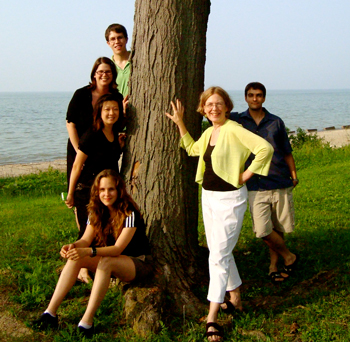by Daniel Hathaway

Brouwer designed Blue Streak as an ensemble that would play summer concerts on the Lake (it gets its name from the famous roller coaster at Cedar Point) as well as a vehicle for performing her own compositions and arrangements of works by other classical composers (above: the 2012 ensemble). The personnel changes a bit from season to season. Monday’s group included Jinjoo Cho, violin, Irwin Shung, piano, Maaike Harding, cello, Sarah Beaty, mezzo-soprano and Robert Davis, clarinet, who played three contrasting pieces by Brouwer, plus movements from a suite by Milhaud, Brouwer’s arrangement of a well-known Rossini aria, Dvořák’s own arrangement for cello and piano of his Silent Woods, a duo for clarinet and bassoon attributed to Beethoven repurposed for clarinet and cello, a virtuosic cello piece by Turtle Island Quartet cellist Mark Summer, and three arias from Porgy and Bess, two of them in virtuosic violin and piano arrangements by Jascha Heifetz written for recital encores.
Operating in close quarters with dicey sight lines, Cho, Davis and Shung opened the set with a brilliant and incisive performance of the first movement of Darius Milhaud’s 1936 Suite, later revisiting two subsequent movements, Divertissement, a slower one which involved the piano only halfway through and Jeu, a rhythmically interesting one that was actually a duo for violin and clarinet. Milhaud’s prolific output comprises nearly 450 opus numbers and there’s a lot of similarity between individual pieces, but his bubbly Gallic wit and general avoidance of strong dissonance makes his music genial and listenable — and a fine choice for these circumstances.
Genial and listenable would also go a long way toward describing Brouwer’s own music, though there are clear individual differences in color, texture and inspiration between A Joyful Moment, Whom Do You Call Angel Now? and Deserted Delphi, Veiled in Mist. Joyful Moment neatly encapsulated a whole range of feelings upon hearing of a successful birth in the family after a difficult pregnancy. Angel was particularly affecting. Based on a 9/11 poem by David Adams, Brouwer’s setting was masterful in its clear and lyrical text setting, poignantly declaimed in turn by Sarah Beaty. The quasi-minimalist textures in Delphi were evocative of a famous site visited under magical conditions, and Beaty’s haunting, wordless lines added much to that picture. To her great credit, Margaret Brouwer always knows how long to sustain an idea and exactly when to bring a piece to its conclusion. Other composers: take note.
Interspersed among the Brouwer pieces were lovely moments for individual performers. Sarah Beaty was the model of bel canto clarity and brilliance in Rossini’s Una voce poco fa from Barber of Seville. Cellist Maaike Harding created an evocative scene in Dvořák’s Silent Woods and (after a minor accident when her end pin slipped and she had to begin again) was perfectly riveting in her account of Summer’s demanding Julie-O. Beaty sang a lovely version of Summertime to begin the Gershwin set after which Jinjoo Cho dug into a surging account of Bess, You Is My Woman and wailed away like a diva in It Ain’t Necessarily So. Erwin Shung, who didn’t quite get inside the Gershwin style, earlier contributed a creditable performance of Rachmaninoff’s Prelude in c minor. Harding and Davis lightened the mood at one point with a charming reading of the Beethoven Duo, which worked well enough but is more characteristic with clarinet and bassoon.
This delightful evening owed a lot to the skill of the performers but just as much to Margaret Brouwer’s sensitivity in creating a musical smorgasbord that made sense and worked. A twenty-first century salon-type evening makes a refreshing alternative to standard chamber music fare, and Brouwer and her performers pulled this one off with charm and style.
Published on ClevelandClassical.com July 16, 2013
Clickhere for a printable version of this article.


